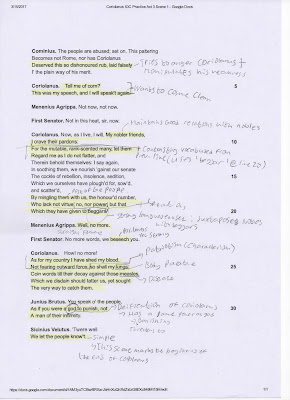In the play Coriolanus, Shakespeare has used the theme of Power as one of its main themes of the play. Being a political play, This underlying theme parallels to the situation that the people of England faced during the time Coriolanus was published. The power dynamics between characters shifts from on side to another as the play progresses.One evident example of this happening in the play is with Coriolanus' Character. Coriolanus lives in two worlds, Rome and the Battlefield. Shakespeare presents his powers differently in these two places. This leaves Coriolanus with the greatest power from all of the characters. As you go down the scale of the importance of the character, the least important character, Plebeians, has the least amount of power. Women in this play were also portrayed as a powerful figure with Volumnia trying to convince her son to make peace with Rome. Another notable example for the theme of power can also be found in Act 1 when the Plebeians were rioting about th
